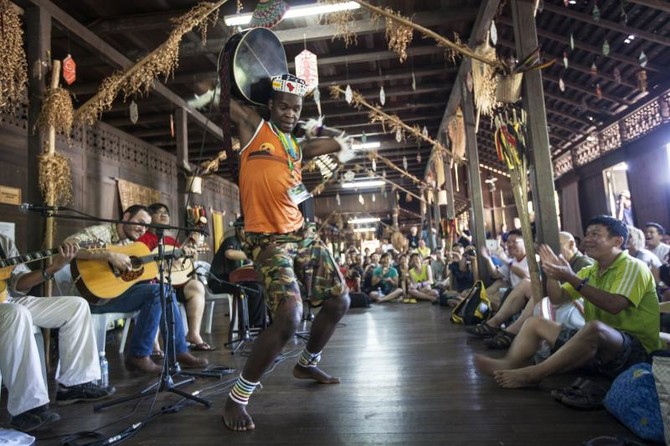If you’re a “world music” aficionado (I just managed to lose some of that genre snobbery), love nature and have a taste for culture, then you must have hit the festival circuit at the Rainforest World Musical Festival. If you didn’t (which is a shame), perhaps next year? In any case here’s the lowdown.
Hosted in the Sarawak-ian state of Borneo, the festival running in its 16th year wrapped up a three-day musical fanfare late June at the Sarawak Cultural Village — a novel locale tucked between the lush green of the rainforest from one end and an endless expanse of the sea on the other.
You lose all count of time, pace and space. It’s literally a slice of heaven until you realize you’re still earth bound when the sticky humidity hits you. It was just summer! Albeit a couple of outfit changes later, you really wouldn’t want to be elsewhere.
The festival ran full-day itineraries with daytime workshops organized in various locations of the Sarawak Cultural Village — some conducted in Iban Longhouses which are traditional, thatched housing units of the Iban tribe in Sarawak — led by the performing musicians and with evening concert performances for three consecutive nights by 21 international acts.
The workshops drew upon educational aspects of dance and music art forms from around the world. From stories, songs and traditions of the Bidayuh people of Sarawak to dance feuds between the Aboriginal Australians and Africans in the art of war— most workshops ending into full-house dance parties of their own— attendees at the festival were pressed for anything other than soaking up the rich cultural vibes and meeting people from all corners of the world they wouldn’t normally on any given day.
Native chanters from indigenous tribes of Sarawak ensured that the threatening rain spritz was calmed by the invocation of oral blessings to Mother Earth on the first night of the festival. Rain or not, everyone was prepared for any manner of downpour. We were in the rainforest after all.
Some of the most outstanding festival features were performances by acts who continue to maintain ancient performing traditions like Palsandae, a Korean performing arts group weaving traditional music with acrobatic movements and shamanic prayers; Spiritual Seasons — a Medieval folk outfit from Ukraine who managed to turn back a couple of hundred years in time; and Nunukul Yuggera, an Australian Aboriginal troupe who continue to portray their ancient religions and tribal legends through music and dance.
Modern musical highlights came from the Pine Leaf Boys of USA for ancient song revival with their home town Louisiana oomph and dance, who have in the past churned four Grammy nominations; Kries, an ethno-rock band from Croatia who hypnotized audiences with ancient chants weaved through dark and progressive grooves; and Mohsen Sharifian and the Lian Band — Iran’s most controversial folklore music ensemble that undertakes on social, cultural and religious themes of the region.
Keeping with an environmental-conscious attitude the festival warranted, the organizers hosted a tree-planting ceremony for visiting guests and media in a creative effort to combat their dense carbon footprint having traveled from various parts of the continent. This also served as a welcome call especially when the surrounding South East Asian states of Malaysia and Singapore were suffering from an environmental inflammation due to illegal land clearing, inducing forest fires from neighboring Indonesia. While the festival by virtue of its ethos possessed great potential in addressing the issue, the press conference officials did not appear very eager to disburse any politically inclined statements.
Mathew Ngau — who also serves as the official festival mascot playing the indigenous sape — seemed taciturn about the recent mishaps, although his music, he says, appears to be a tad more vocal about the conservation of nature. “My music is always talking about living with nature, but talking about the recent issue of the Indonesian forest-felling is very political. I cannot talk about it. My music is already talking about this issue. My music is enough already.”
Ngau is a 60-year-old tribal from the interior village mountain of the Orang Ulu tribe who continue to live in Longhouses. Possessing a face that clearly belies his age, he shares that the secret to his looking young is the effect of “living in the mountains and eating jungle food.”
Ngau plays the traditional sape (pronounced sampeh in his local dialect) in the band Lan E Tuyang that roughly translates into “true friend.”
The sape is a two-stringed distant progenitor of the modern guitar except that it’s constructed from natural wood with strings made from tree creepers called Emang— a tough natural equivalent to stainless steel wires used in modern-day guitars.
Ngau says that his generation has made the switch to a 4-stringed sape that uses steel strings although with movable frets that are pasted with beeswax, whose positions he often changes according to the harmony demanded by songs. Gaining the attention of the younger generation to traditional music “is a challenge,” he concedes, although traveling around the world and playing in big concerts has certainly helped dispel certain notions about the sape and made it “acceptable to people.”
Rafly, lead vocalist of a rising Indonesian band Rafly Wa Saja — who sing about local wisdom, nature, social contemplations and reflections — said, “God only shows us a little glimpse of all the beauty that exists. The rest can be understood and admired only when man learns how to deal with nature.”
He appeared eager and easy to express his opinion on the recent environmental and political backlash in the Malaysian state by saying: “Some people don’t really care. Most people are not living in a simple way. I am very sympathetic about what happened recently. Let’s start from the bottom of our heart to reconcile politically and culturally.”
• [email protected]
Can music and nature join people politically?
Can music and nature join people politically?















